|
|
|
Sort Order |
|
|
|
Items / Page
|
|
|
|
|
|
|
| Srl | Item |
| 1 |
ID:
113926
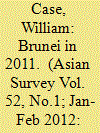

|
|
|
|
|
| Publication |
2012.
|
| Summary/Abstract |
Brunei Darussalam remained untroubled throughout 2011. The government experimented with greater political openness and social reforms. It organized an election for at least part of its Legislative Council. It continued to make advances on women's and environmental issues. Meanwhile, the oil-based economy mostly remained steady. Foreign relations were benign.
|
|
|
|
|
|
|
|
|
|
|
|
|
|
|
|
| 2 |
ID:
089924
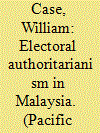

|
|
|
|
|
| Publication |
2009.
|
| Summary/Abstract |
This paper proposes an analytical framework by which to understand the origins, functioning, and dynamics of electoral authoritarianism in Malaysia. It thus explores notions of historical legacies, structural pressures, critical junctures, and institutional formation. But in guarding against teleology, it also considers elite agency and 'stunning elections'. This framework is applied in the case of Malaysia because, in anticipating contemporary trends, the country has so long perpetuated a paradigmatic electoral authoritarian regime. And yet, with many countries growing similarly authoritarian today, Malaysia has suddenly become less so, with the government having been dealt a startling setback in its latest contest, held in March 2008, thus losing its extraordinary majority in parliament and control over five states. Hence, if democratization once again gains steam round the world, Malaysia may presage this trend too, with its electoral authoritarianism, long so resilient, perhaps poised today on the edge of transition.
|
|
|
|
|
|
|
|
|
|
|
|
|
|
|
|
| 3 |
ID:
064683


|
|
|
| 4 |
ID:
085854


|
|
|
|
|
| Publication |
2008.
|
| Summary/Abstract |
In recounting Hong Kong's chief executive election in 2007, this paper charts the unexpected appearance of an "unauthorized" candidate and the occurrence of vibrant campaigning.
|
|
|
|
|
|
|
|
|
|
|
|
|
|
|
|
| 5 |
ID:
085752
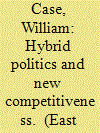

|
|
|
|
|
| Publication |
2008.
|
| Summary/Abstract |
In recounting Hong Kong's chief executive election in 2007, this paper charts the unexpected appearance of an "unauthorized" candidate and the occurrence of vibrant campaigning. Further, as electoral competitiveness increased, the liberal form of authoritarian rule that has characterized politics in the Hong Kong Special Administrative Region (HKSAR) began to change in ways that parallel the electoral authoritarianism practiced in Singapore. This paper argues that such change, if regularized and enhanced, may bring greater stability to the HKSAR's politics, yielding greater legitimacy, popular compliance, and hence, new efficiencies in control. Even so, analysis of the chief executive election shows that this competitiveness was strongly resisted by the central government in Beijing.
|
|
|
|
|
|
|
|
|
|
|
|
|
|
|
|
| 6 |
ID:
103643


|
|
|
|
|
| Publication |
2011.
|
| Summary/Abstract |
Political contours changed little in Laos during 2010, leaving its single-party system in place. The economy continued to grow quickly, although not in ways that uplifted ordinary citizens. And deepening relations with China encouraged the government to open new channels to the United States.
|
|
|
|
|
|
|
|
|
|
|
|
|
|
|
|
| 7 |
ID:
089921


|
|
|
|
|
| Publication |
2009.
|
| Summary/Abstract |
In keeping with much analysis of Southeast Asian politics today, the papers in this special issue argue that it is less fruitful to study democratic transitions than authoritarian durability. At the turn of the 21st century, Southeast Asia featured three new democracies. But only Indonesia is still rated by Freedom House as 'politically free'. Yet even here, the legislators and party leaders who have been thrust up by democratic change sooner engage with top bureaucrats and business tycoons in pursuit of largesse than produce public goods. In the Philippines, corrupt practices and human rights violations have grown so severe that the country lost its rating of 'free' in 2007. And Thailand's democracy was disfigured by executive abuses, then overturned through a military coup. This issue investigates, then, the new authoritarian practices that mar regimes in Indonesia, the Philippines, and Thailand, as well as older forms that have persisted or been reconstituted in Malaysia, Vietnam, and Burma. Where these papers differ from much recent scholarship, however, is in their extending study from historical and structural factors to elite-level voluntarism and relations.
|
|
|
|
|
|
|
|
|
|
|
|
|
|
|
|
| 8 |
ID:
081857
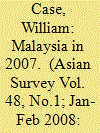

|
|
|
|
|
| Publication |
2008.
|
| Summary/Abstract |
2007 appeared to be a year of political and economic continuity in Malaysia. The government won three by-elections. The economy grew at 5.6%. Tensions over ethnic relations and Islamization simmered, though with probably no greater intensity than in past years. And foreign relations were smoothly conducted. But in an extraordinary scandal, a prominent political advisor went on trial for abetting the murder of his former mistress.
|
|
|
|
|
|
|
|
|
|
|
|
|
|
|
|
| 9 |
ID:
119099
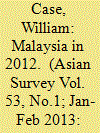

|
|
|
|
|
| Publication |
2013.
|
| Summary/Abstract |
During 2012, Malaysia's Prime Minister Najib Razak undertook a number of political and economic reforms. At the same time, his rival, former Deputy Prime Minister Anwar Ibrahim, was found not guilty of sexual misconduct charges. However, major corruption scandals continued to break. And a large scale protest over electoral cheating turned violent. Meanwhile, the economy remained on an even keel, while the government negotiated with the U.S. over entry into the Trans-Pacific Partnership.
|
|
|
|
|
|
|
|
|
|
|
|
|
|
|
|
| 10 |
ID:
130186
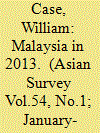

|
|
|
|
|
| Publication |
2014.
|
| Summary/Abstract |
The most important event to take place in Malaysia during 2013 was its general election. The incumbent National Front government was returned to power, though with less than a majority of the popular vote. The government then rewarded Malay supporters with new affirmative action programs. It also repulsed an armed incursion into Sabah launched from the southern Philippines.
|
|
|
|
|
|
|
|
|
|
|
|
|
|
|
|
| 11 |
ID:
051172


|
|
|
|
|
| Publication |
Surrey, Curzon Press, 2002.
|
| Description |
x, 318p.
|
| Standard Number |
070071636X
|
|
|
|
|
|
|
|
|
|
|
|
Copies: C:1/I:0,R:0,Q:0
Circulation
| Accession# | Call# | Current Location | Status | Policy | Location |
| 048221 | 321.80954/CAS 048221 | Main | On Shelf | General | |
|
|
|
|
| 12 |
ID:
059504


|
|
|
|
|
| Publication |
Jan-Feb 2003.
|
|
|
|
|
|
|
|
|
|
|
|
|
|
|
|
| 13 |
ID:
050877


|
|
|
|
|
| Publication |
Jan-Fen 2001.
|
|
|
|
|
|
|
|
|
|
|
|
|
|
|
|
| 14 |
ID:
064467


|
|
|
|
|
| Publication |
May-Aug 2005.
|
|
|
|
|
|
|
|
|
|
|
|
|
|
|
|
| 15 |
ID:
153718
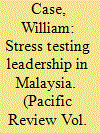

|
|
|
|
|
| Summary/Abstract |
Malaysia's strategic development fund, 1 Malaysia Development Corporation, has suffered enormous losses. Funds have been traced to the accounts of the prime minister, Najib Razak. Amid the scandal that has followed, Najib's leadership has been challenged. Analysis begins by identifying the institutions that have historically stabilized Malaysia's politics, including a single-dominant party, a fused party-state, an electoral authoritarian regime, a controlled legislature, and a powerful security apparatus. Next, it examines how these resilient institutions fell into the hands of Najib's rivals, converting them into ‘threatening vectors’. Finally, it shows how Najib, in exercising ruthless new leadership, regained control over institutions and turned back challenges.
|
|
|
|
|
|
|
|
|
|
|
|
|
|
|
|
| 16 |
ID:
094422


|
|
|
|
|
| Publication |
2010.
|
| Summary/Abstract |
Leading theories of transitions from single-party dominant systems begin with economic crisis, the party's loss of patronage resources, and elite-level defections. The multiparty elections that are then held exert no independent effect, but instead register neutrally the party's decline and the democratization of politics. This article, however, shifts attention from the dominant party to citizens and elections in noncrisis conditions. It argues that citizens assess on key dimensions the dominant party's legitimacy or worthiness of support. Further, where they grow critical of its policy outputs, they scrutinize more closely its conformity to procedures. And as they anticipate that their voting preferences will be thwarted by electoral manipulations, they vote in protest, perhaps producing a "liberalizing electoral outcome." Elections, then, do not simply indicate the dominant party's decline. By deepening alienation, they help citizens to cause it. Analysis is set in Malaysia, long an exemplar of single-party dominance, but recently a case in which the government was dealt a striking electoral setback.
|
|
|
|
|
|
|
|
|
|
|
|
|
|
|
|
| 17 |
ID:
145439


|
|
|
|
|
| Summary/Abstract |
Factional dynamics intensified within the Communist Party of Vietnam during 2015 as it approached its 12th Party Congress, scheduled for early 2016. Economic growth also increased during the year, projected to average 6.5%. Relations with the U.S. warmed steadily, but also thawed slightly with China.
|
|
|
|
|
|
|
|
|
|
|
|
|
|
|
|
|
|
|
|
|